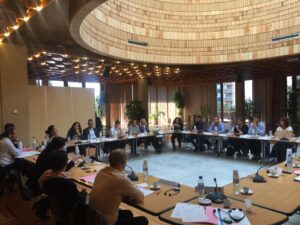
Paris, France, October 2018 – After a first meeting in Salzburg (AT) in March, the group of cities partaking in the PRACTICIES project for the prevention of violent radicalisation in cities, which is led by Efus, held its second working meeting on 4-5 October in Efus’ head office in Paris. The objectives of the meeting were to discuss the project’s development with the members of the group of cities, to show them the experience of the Seine-Saint-Denis area, near Paris, in preventing violent radicalisation, and to start working on the recommendations for local authorities that will result from the project.
The seminar gathered representatives of the project’s partner cities: Amadora (PT), Augsburg (DE), Berlin (DE), L’Hospitalet de Llobregat (ES), Liege (BE), Lyon (FR), Nice (FR), Solna (SE), Riga (LV) as well as the region of Calabria (IT) and other partners such as Bouzar Expertises, Kantar Public, the Rey Juan Carlos University, the University of Toulouse and KEMEA.
————-
> A first day devoted to the studies’ results…
The first day was focused on a presentation of the project’s development by the delegate from the University of Toulouse, who explained the progress made in the different work packages.
The representative of Kantar Public, a consulting agency specialised in public policies, then presented the main findings of the Europe-wide survey carried out as part of the work package 2, which includes an inventory of insecurity and radicalisation factors. Carried out in 12 European countries among people aged 14-25, the survey showed that 47% think that radicalisation is widespread in their country, and that 83% think this phenomenon will grow or remain at the same level in the years to come.
The morning concluded with a presentation from the representatives of Bouzar Expertise, a consultancy firm specialised in the “non discriminatory management of the expression of religion, as well as in the prevention, detection and fight against risks linked to violent radicalisation”. Theypresented the main findings of the study carried out as part of the third work package, which focuses on the etiology of radicalisation processes and the levels of radicalisation that can be considered as tipping points.
>… and a meeting with various stakeholders in the Seine-Saint-Denis area
Also on the first day’s agenda was a meeting with representatives of the national authorities in the Seine-Saint-Denis area, near Paris. The PRACTICIES participants were received by the Prefect in charge of Equal Opportunities, the Deputy Prosecutor of Bobigny and local associations that manage people who have been identified and reported as being radicalised or in the process of being so. The Prefect presented the characteristics of this county (département in French): high population density, a predominantly young population, numerous socially deprived neighbourhoods, a large proportion of single-parent families, and numerous industrial areas.
In this context, the Seine-Saint-Denis département created in 2014 a Unit for the Prevention of Radicalisation and Support to Families (Cellule de Prévention de la Radicalisation et d’Accompagnement des Familles, CPRAF), upon request from the Ministry of the Interior. Members of the PRACTICIES group exchanged with the professionals working in this unit, who explained how individuals in their care are managed. The Deputy Prosecutor of Bobigny and local associations working with individuals identified as radicalised or being radicalised also took part in the meeting.
Various institutions (in particular police and the town hall) share information on the youngsters who have been identified as being radicalised. It is then classified according to whether these individuals might become violent. Those identified as such are kept on record and are monitored by the authorities, although no intervention is made. Otherwise, they are taken off the record and put into the care of the CPRAF, which can then support them in a de-radicalisation process.
Concluding these exchanges, the representatives of the cities of Riga and Augsburg presented their own scheme for the prevention of violent radicalisation. Riga, which is not as much affected by radicalisation as other cities in Western and Central Europe, adopted an approach focused on primary prevention, inclusivity, and the fight against discrimination. Contrary to Riga, Augsburg is directly confronted with the issue of radicalisation: several local youngsters have been to Syria and there are two mosques in the city that are known for preaching a Salafist ideology. The city’s approach is based upon the prevention of discrimination and the involvement of all concerned parties (notably police, youth educators, youngsters and families).
> A second day devoted to the recommendations for local actors
The second day of the seminar was devoted to discussing the recommendations for local policies on the prevention of radicalisation. The representatives of the partner cities expressed their priorities during a brainstorming session and then worked in small groups. Five groups were set up to work on transverse themes (that came out of the brainstorm) such as innovation, social inclusion, training, professional culture, the participation of civil society, and diagnoses.
Based on the information gathered during the feedback session on these exchanges, Efus will prepare draft recommendations to be shared with the whole PRACTICIES consortium. Further work will be carried out on these, with a multi-partnership approach, at the meeting scheduled in Rende (Calabria, Italy), on 25-26 November. After that, the project partners will be able to start writing the recommendations through the Efus Network platform.
As part of its work package, Efus will keep organising extensive exchanges between local authorities and the research institutions involved in PRACTICIES. It is also in charge of organising the final conference, in the spring of 2020.
The working group is open to all interested Efus members.
————-
More information on the PRACTICIES project




